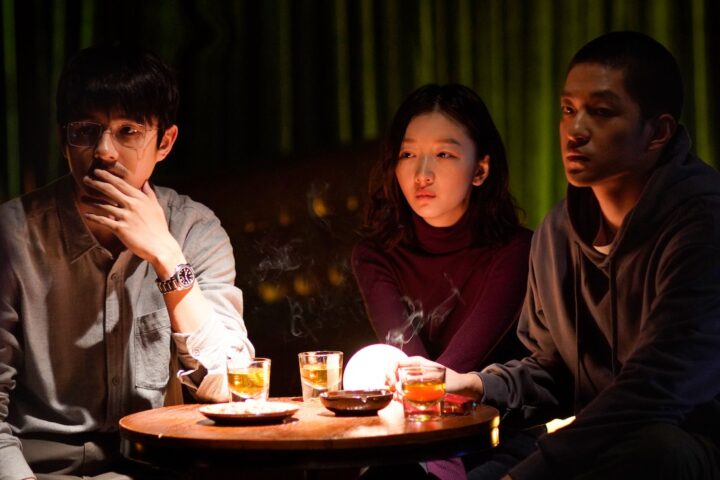There’s a beautiful scene in Jia Zhangke’s 2004 film The World in which the protagonist, Tao, crosses paths with an industrial worker nicknamed Little Sister on the rooftop of an unfinished building. They chat aimlessly beneath towering spires of exposed rebar until a massive plane soars overhead, drowning out their voices. “Tao, who flies on those planes?” he asks, to which she responds, “Who knows…I don’t know anybody who’s ever been on a plane.”
It’s this precise contrast of stasis and flux, of the sublime and the quotidian, of simple personal dreams swallowed up by massive national ambitions, that characterizes Liu Jian’s newest feature, Art College 1994. Jia also lends his voice to one of its characters: Gu Yongqing, a “roving artist abroad” who speaks of “the mysterious power of art” during a visiting lecture at the titular art college. This is Liu’s third animated feature film, and it cements his status as one of the most distinct cinematic voices among the still-emergent seventh generation of Chinese directors. Tapping Bi Gan, the leading luminary of this nascent group, and Jia, the leading luminary of the generation before it, to voice characters in Art College 1994 is a canny gesture toward the complex braid of currents that’s easy to miss beneath its tranquil surface.
Throughout the film, Liu employs a limited third-person perspective to amble without special favor among a group of students bracing for their graduation from Southern Art College. Zhifei (Chizi), nicknamed Rabbit, is an oil painter prone to open-ended pontification and best friends with Xiaojun (Dong Zijian), a ruminative practitioner of traditional Chinese painting who’s beginning to strain against its conventions when he quietly falls for Lili (Zhou Dongyu), a gentle musician who contemplates a dull but financially advantageous marriage prospect that’s vehemently opposed by Hong (Papi Jiang), her brash, cabaret-singer roommate.
The film dissembles the three-act screenplay structure, which organizes time around the ratcheting up and release of tension, and scatters the story beats to the breeze. Here, cinematic time isn’t tethered to the passing of events, as we’re instead drawn into a luxuriant, unhurried timelessness, established by long takes, slow tracking shots (a white butterfly following Lili and Hong’s walk from class is a highlight), and careful attention paid to small details.
Art College 1994’s languid pace gives the animation some breathing room. Nearly still shots of a plate of steaming dumplings, ripples on an evening lake, and clothes drying on a line under the spring sun are etched with finer detail than could have been possible in 2017’s Have a Nice Day, given its propensity toward acrobatic, form-pushing visuals, from its Mao-era propaganda style montages to its motion accentuations ripped straight from manhua. The art that Liu and animation director Jiajia Li created for the students is also fantastic in its own right, showcasing a range of styles from faded, Twombly-esque curlicues on textured canvases to intricate guó huà, or Chinese “native painting,” to an affectionate roast of undergrad-core performance art.
Liu is also endeared to the stumbling intellectualism of conversations at this age. Art College 1994 is full of them, treating personal inquiries—from “Is God really dead, or is Nietzsche really crazy?” to “If everything we lose is gained in another way, will everything we gained be lost in another way?”—with delicacy and compassion. The film lets the dust of early twentysomething anxiety settle to reveal the characters’ true concerns, which are timeless and enduring, as when Lili asks, “Hong, do you think we’ll actually become who we want to become?”
The film vividly captures the tremble of youth on the cusp of adulthood, while at the same time painting at the fringes a specific portrait of China on the cusp of its major transformation to a market-led economy. Liu is as fascinated by the ’90s as Jia, and explores them in much the same way, by creating a stirring marriage of the personal and the national, the now and the always.
Since 2001, we've brought you uncompromising, candid takes on the world of film, music, television, video games, theater, and more. Independently owned and operated publications like Slant have been hit hard in recent years, but we’re committed to keeping our content free and accessible—meaning no paywalls or fees.
If you like what we do, please consider subscribing to our Patreon or making a donation.





